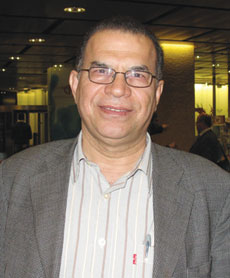
|
 |
 |
|
|
|
|
|
|
|
|
|
|
|
|
|
|
|
|
|
|
|
|
|
|
Human Rights Activist, Abdulla Al-Derazi:We have Good Relation with the Interior Ministry and are Concerned about Torture Dossier
In our efforts to keep local and international public opinion informed about the human rights situation in Bahrain, the Monitor interviewed the Secretary General of the very first human rights Society in Bahrain who is also an academic at the University of Bahrain. The Bahrain Human Rights Society was established in 2001 and is one of the most active Societies in Bahrain. To what extent is the Bahrain Human Rights Society satisfied with the human rights situation? And what are your major concerns? Undoubtedly, there is an improvement in the situation in comparison with previous years, especially during the time of the State Security Law. Currently, the margin of freedom has increased, municipal and parliamentary elections have taken place, the Public Prosecutor’s Office and Constitutional Court have been established and prisons have been cleared. As for the second part of the question, what really concerns us are the following: Non-closure of the file of victims of torture, martyrs, the exiled and those harmed by the events of the previous era, i.e. since enforcing the State Security law and up to his Majesty’s taking over the throne . We need to close this file and apply the principle of transitional justice and compensate the victims for the damage inflected on them. The recent allegations of return of systematic torture since the events of December 2007 until the case of the Al-Hujjaira. The families of the detainees and the released prisoners talked about the physical and psychological torture they were subjected to during their detention. The Public Prosecutor rejected repeated formal requests made by the Bahrain Human Rights Society to visit the detainees to verify these allegations by a professional and independent party. The adoption of the Terrorism Act, Assembly Law and Law of Association will hinder freedom of expression. The closure of the websites of some legally licensed political societies during a time we are aiming to increase the freedom of electronic media and working towards referring media breaches to the Judiciary and not to the Ministry of Information. We read about your Society’s visit to the women’s prison, do you think that a new stage has started in your relation with the security authorities, and what is the future of this relationship? And what are the obstacles facing its development, if any? The Interior Ministry’s permission for the Society to visit the Women Rehabilitation Centre is an excellent step, and shows that the Minister appreciates the importance of joint co-operation between civil and official institutions for providing better services for society (a detailed report of this visit will be published in the near future). This step is regarded as a positive development and a turning point in our relationship with the Interior Ministry. A joint committee between the Society and Ministry has been formed and it meets regularly for coordination and follow-ups. The Ministry has also solved all the issues presented by the Society, which including those raised by citizens and prison inmates. As for the obstacles, I do not think they exist, because the objective of both the Ministry and Society is to develop the human rights situation. However, we do need to deepen the trust between us so that the human rights situation in Bahrain improves. To add to this, the Society’s role needs to be re-assessed, its independence respected, and a balanced and equal partnership between it and government institutions needs to be established. Ultimately, what is of importance to us is respecting citizens’ rights and putting an end to any violation. It is not our objective to confront the Government but we do stress the fact that we will not abandon our goals which are the bases of the Society, and will not ignore any abuses that occur, and we seek to address them with wisdom and prudence. With regards to civil human rights societies in Bahrain, we are witnessing a clear difference in their performances, what is your evaluation of their activities after the long years since their establishment? And how do you evaluate their relationship with one another? And what is the scope of their development at the professional and institutional level? With regards to civil human rights societies in Bahrain, we are witnessing a clear difference in their performances, what is your evaluation of their activities after the long years since their establishment? And how do you evaluate their relationship with one another? And what is the scope of their development at the professional and institutional level? |
